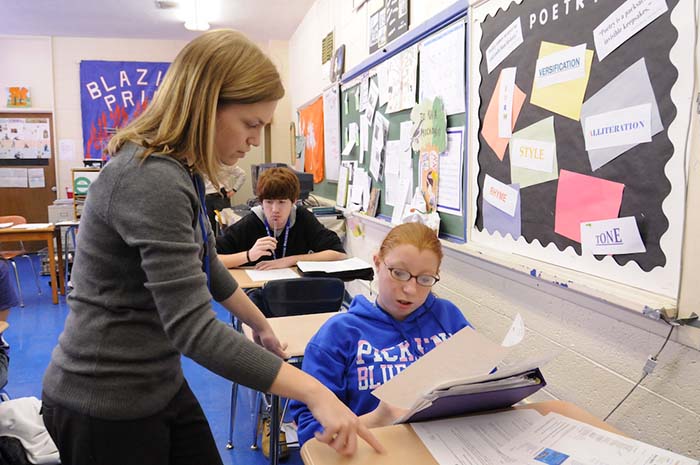-
Academics
- Academics Overview
-
Undergraduate
- Undergraduate Overview
- Agricultural Education
- Early Childhood Education, B.A.
- Elementary Education, B.A.
- Middle Level Education, B.S.
- Mathematics Teaching, B.S.
- Modern Languages Education, B.A.
- Special Education, B.A.
- Secondary Education, B.A.
- Science Teaching, B.S./B.A.
- Athletic Leadership Minor
- Human Capital Education and Development
-
Master's and Specialist Programs
- Master's and Specialist Programs Overview
- Athletic Leadership (Online)
- Counselor Education
- Educational Leadership
- Human Resource Development
- Learning Sciences
- Literacy (Online)
- Middle Level Education, MAT
- Modern Languages, MAT
- Secondary Education, MAT
- Special Education (Online)
- Student Affairs
- Teaching and Learning (Online)
- Teaching and Learning, Ed.S.
- Doctoral Programs
- Certificates | Endorsements | Licensure
- Expressway to Tiger Town
- Bachelor's To Master's | Teacher Residency
- Teaching Fellows
- Research
- Programs
- Students
- About
English to Speakers of Other Languages (ESOL) Certificate

The Clemson University College of Education offers a five-course pathway to ESOL Certificate at both the graduate and undergraduate level. Following completion of the ESOL coursework, students will have the option to apply for an add-on ESOL certification from the South Carolina State Department of Education. Please refer to the South Carolina Teacher Certification Manual for the most current certification requirements.
The graduate ESOL coursework can also be completed alongside our Literacy M.Ed. program. Visit our Literacy program website for more information.
View Our Master's Brochure Request Master's Information Apply Now: Master's View Our Undergraduate Brochure
Master's Certificate
-
Program Goals
The ESOL Certificate courses are designed to help teachers meet the needs of students for whom English is not their dominant language. The goal is to prepare teachers to support student success in school and in society through the development of cultural awareness and English language proficiency in listening, speaking, reading, and writing.
-
Admission Requirements
Applying to the Program:
The ESOL Certificate only admits students for the summer or fall entrance term.
Apply by submitting a Graduate School application.Application Deadline:
Summer applications due by: March 15th
Fall applications due by: June 30thApplication Requirements:
Applicants must:- Have obtained a baccalaureate degree
- Have obtained initial Teacher Certification
- Submit unofficial transcript(s) via the Graduate School Application - official transcript(s) will be required upon acceptance
-
Program Requirements
The ESOL Certificate requires the completion of the five courses listed below. All courses are three credit hours and are taught asynchronously online.
EDLT 8140: Reading and Writing Instruction and Assessment for Culturally and Linguistically Diverse Students
Examines cross-cultural theoretical dimensions, principles and research related to second language acquisition and provides a knowledge base for teaching the reading and writing processes to English language learners (ELLs). Instructional models, strategies and tools supporting ELLs and their learning needs are presented.EDLT 8220: Principles and Strategies for Teaching English Speakers of Other Languages
Helps participants develop culturally and linguistically responsive classrooms with instructional strategies for teaching the language acquisition process within the context of academics supportive of English language learners (ELLs) and their learning needs.EDLT 8230: Introduction to Linguistics
Introduction to linguistics, including the subfields of syntax, morphology, phonology, semantics, pragmatics and sociolinguistics. Also includes the study of writing systems and applications to literacy, language acquisition, and language contact and changeEDLT 8250: Cultural Diversity in Education
Examination of components of culture, including but not limited to race, ethnicity, linguistic identity, and gender, their impact on a student’s identity, and how this identity is tied to a student’s learning and academic achievement.EDLT 8240: Practicum in the Instruction of ESOL Elementary and Secondary Learners
Supervised observation and teaching experiences in teaching English to Speakers of Other Languages (ESOL) in cooperation with selected elementary and/or secondary schools.In addition to completing the required coursework, teachers must also pass the PRAXIS exam and apply to the S.C. Department of Education to be certified. Please refer to the South Carolina Teacher Certification Manual for the most current certification requirements.
-
Financial Information
Tuition
The ESOL Certificate is offered at our tier three traditional tuition rate - approximately $594 per credit hour for part-time in-state students or $1,182 per credit hour for part-time out-of-state students.Financial Aid
For information regarding financial aid, please contact the Office of Student Financial Aid.* Tuition and fees are subject to change. The information provided on this webpage is only an approximation.
-
Find Out More
For more information regarding the certificate or questions associated with applying to the certificate, please contact Madison Hudson at mhedden@clemson.edu.
Undergraduate Certificate
-
Program Goals
The Clemson University College of Education offers add-on ESOL coursework that can lead to an endorsement or a certificate. Faculty designed the add-on ESOL courses to help teachers meet the needs of multilingual learners and prepare educators to effectively teach and support multilingual learners by developing expertise in culturally responsive practices, second language acquisition and linguistically inclusive instructional strategies.
-
Eligibility
Students can add on coursework to any College major leading to initial or professional teaching certificates.
-
Program Requirements
The ESOL Certificate requires all five courses listed below. The ESOL endorsement requires three courses (EDLT 4700, EDLT 4720, and EDLT 4740/4741). All courses are offered online, asynchronously. However, the EDLT 4741 Practicum Lab will require in-person teaching as part of a field experience. Courses may vary in availability depending on demand.
EDLT 4700: Foundational Principles for Teaching PK-12 Multilingual Learners
Introduces preservice teachers to theories and principles related to second language acquisition and presents instructional models and strategies for teaching the language acquisition process. EDLT 4700 must be taken first as it is a prerequisite to the other endorsement/certificate courses.
EDLT 4710: Introduction to Linguistics for Teachers of Multilingual Learners
Introduction to linguistics includes overview of phonetics, phonology, morphology, syntax, semantics and pragmatics. Includes the study of second language acquisition, evolution of language systems, and connections to writing systems.
EDLT 4720: Cultural & Linguistic Diversity in PK-12 Education
Examination of multiple components of culture, including sociocultural identity markers with a focus on how cultural and linguistic diversity impact students’ identity and how this identity is tied to students’ learning and academic achievement.
EDLT 4730: Teaching Reading and Writing to PK-12 Multilingual Learners
Provides strategies and tools to effectively teach reading and writing to multilingual learners in PK-12 settings. Covers developmental literacy processes/instructional techniques. Elementary Education majors will take EDLT 4630: Teaching Reading and Writing to Elementary Multilingual Learners.
EDLT 4740/4741: Practicum in the Instruction of Multilingual Learners
Supervised observation and teaching experiences with working with multilingual learners through observations and planning, teaching, and reflection cycles.
“The Clemson University ESOL Certification program not only extended my understanding of how English Language Learners learn within the mainstream classroom, it also created an acute awareness of the requirements that we have as educators to serve these students. I am so thankful that I completed this program at Clemson University. In a society that continues to see growth of international learners, I feel completely prepared to teach all students and equip them for successful lives and careers.”
Carla JanoskyELL TeacherGreenville County School District

